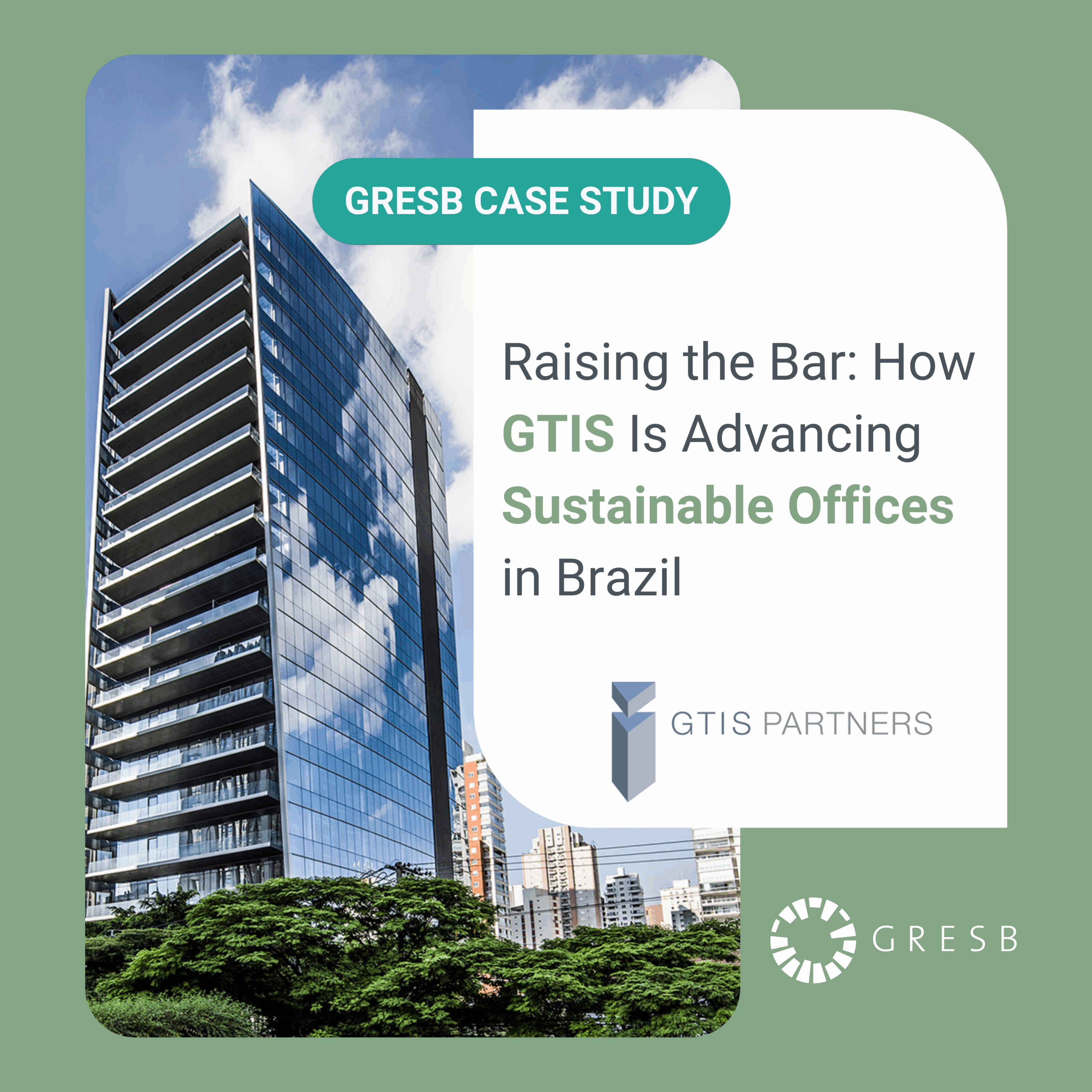About GTIS Partners
GTIS Partners is a global real estate investment firm in the Americas, headquartered in New York with seven more offices in the US, Brazil, and Germany. The firm was founded in 2005 and manages USD 4.6 billion in gross assets, active across a wide range of real estate sectors including single family and multifamily housing, office, industrial/logistics, and hospitality, as well as opportunity zone investments.

Business type: GRESB Real Estate Developer & Manager
Reporting Region: Brazil
Market Capitalization: USD 4.6 billion globally; USD 367.3 million for Brazil Fund III
Use of GRESB: GRESB Real Estate Assessment
Sustainability in Focus
GTIS integrates sustainability across the full investment lifecycle, using GRESB insights for selected funds to guide strategy and deliver measurable performance improvements. Current targets include:
- Finalizing a comprehensive Climate Resilience Plan for Brazil Fund III to address physical and transition climate risks
- Increasing data coverage across water and energy to 100% and waste diversion from landfill to 40% from a 2023 baseline
- Expanding renewable energy use to 100% across the Brazil Fund III portfolio by 2027
From investor demand to strategic integration
When GTIS launched its first fully dedicated real estate fund in Brazil in 2008, sustainability was already part of the investment equation. Since then, the company has introduced two additional Brazil-focused funds, embedding sustainability as a core element of investment strategy and deal analysis, supported by ongoing participation in the GRESB Assessment.
For Brazil Fund III, which began reporting to GRESB in 2017, sustainability integration was initially driven by investor expectations—particularly from European investors seeking a credible, standardized way to assess sustainability performance. GRESB’s structured framework provided the transparency and comparability needed to communicate progress effectively.
Over time, GTIS’s approach evolved beyond investor compliance. GRESB became a strategic tool to identify improvement opportunities and refine business practices across the portfolio. Today, sustainability considerations are fully embedded in GTIS’s decision-making, shaping asset acquisition, development, and ongoing operations.
“GRESB has evolved from a reporting requirement into a strategic decision-making tool that informs our investments and delivers long-term value through more resilient and efficient assets,” said Beatriz Rosique, Managing Director for Compliance, Risk, Data Protection, and Corporate Responsibility at GTIS.
Using data to drive sustainable performance
From the start, GRESB participation has acted as a catalyst for operational improvement at GTIS. Early assessments revealed gaps in portfolio-wide data coverage, prompting GTIS to install automated monitoring systems in new developments. This investment not only improved data quality but also enabled more precise year-over-year performance tracking.
GRESB’s benchmarking and assessment results have also informed targeted upgrades with measurable impact. For example, a series of HVAC retrofits across three office assets reduced energy consumption by a combined 1.3 million kWh over two years—yielding savings between 11% and 35% per building.
The same data-driven approach underpins GTIS’s strategy for maintaining competitiveness in a market where rapid building obsolescence is a challenge. Technical building assessments and operational certifications help GTIS extend asset lifespans, optimize efficiency, and avoid costly full-scale retrofits.
This strategy has also translated into measurable improvements in tenant satisfaction. By conducting thorough technical assessments and pursuing operational certifications such as LEED and WELL, GTIS has enhanced building performance, reduced operational costs, and created healthier, more efficient environments for tenants.
Resilience planning is also deeply integrated into the investment process. Every asset—whether a land parcel, development, or operational property—undergoes a physical climate risk assessment. Any identified risks are addressed through tailored mitigation plans and related costs are incorporated into underwriting from the outset. In one Rio de Janeiro office, for example, climate risk analysis showed heat stress as a significant future risk. Although the air-conditioning system met current standards, GTIS proactively replaced the fan coils with higher-capacity systems to align with its long-term resilience standards.
GTIS’s 2025 goals for Fund III—including finalizing a Climate Resilience Plan, expanding renewable energy use, increasing waste diversion, and improving data coverage—were all developed through a GRESB gap analysis and aligned with global benchmark trends.
Leading by example in Brazil’s real estate market
Over the past decade, sustainability in Brazil’s real estate sector has shifted from a niche differentiator to a baseline expectation. In 2005, the region saw its first LEED-certified building; today, 63% of corporate AAA office buildings in Latin America are certified under sustainable standards (JLL, 2024).
This market transformation has been mirrored in the investment community. In 2013, eight Latin American funds participated in GRESB; by 2024, that number had grown to 47—where GTIS Brazil funds have consistently ranked among the top performers.
For GTIS, this evolving landscape reinforces the value of sustained GRESB participation. By combining global benchmarking with locally tailored strategies, GTIS is helping set the standard for sustainable investment in Brazil’s office sector—balancing climate resilience, energy efficiency, and tenant satisfaction to deliver long-term value.
“GRESB keeps us ahead of the curve and aligned with international best practices by transforming our sustainability goals into measurable results. Our commitment is to deliver long-term value—both for our stakeholders and the communities in which we invest,” said Rosique.